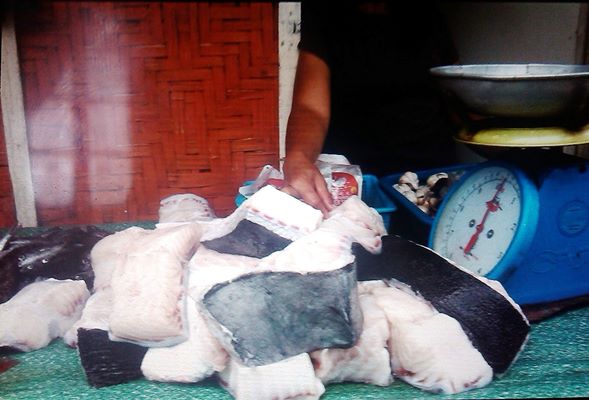Large slabs of white fish meat stood out in a roadside stall in Asturias town, midwest Cebu.
The fresh catch turned out to be shark meat, possibly of thresher sharks, whose capture is banned in Cebu province.
At least 19 kilos were seized on the spot by Capitol Security Chief Loy Madrigal who was travelling back to Cebu City Tuesday afternoon from San Remigio town in north Cebu.
The female stall vendor said the fish was “lawihan”, a local name for thresher sharks in northern Cebu.
Madrigal, who happened to be looking outside the vehicle window, said he immediately noticed the distinct white color and large cuts.
“After I saw the color of the meat, I already figured out it was that of sharks. It’s whiter than the meat of other fish,” said Madrigal, who also heads the Provicial Anti-Illegal Fishing Task Force.
The seized fish meat will be disposed of by burying it in the ground, said Madrigal. A few cuts will be left for inspection by a marine biologist to verify the shark species.
BANNED CAPTURE
A 2012 Cebu provincial ordinance bans the “capture, killing, transport or selling of thresher sharks, which is listed as a “vulnerable” species by the International Union of Conservation of Nature (IUCN).
Madrigal did not arrest the vendor and let her off with a reprimand.
“She did not know that selling shark meat was illegal. Wala gyud sila’y kalibutan (They had no idea). So I just gave them a warning not to do it again,” he told Cebu Daily News.
“If it happens again and they have full knowledge about the ordinance, I will arrest them,” he added.
The use of shark meat as a cheap meat source for local fishballs and seafood tempura was highlighted this year with the seizure of a truckload of thresher shark meat headed for a seafood processing plant in Lapu-Lapu City.
MERCURY
The flesh of sharks is known to contain high levels of mercury, a toxic metal that accumulates in the body.
“This is because mercury is stored in the muscle tissues of fish, and when predatory fish eats another fish, it assumes all of the mercury stored in the body of its prey,” according to a research paper published by Oceana, an international marine conservation group.
For this reason, the Environmental Protection Agency in the United States in 20014, issued a warning for pregnant women, nursing mothers and young children not to eat shark, swordfish, king mackerely and tilefish.
“While nearly all fish and shellfish contain traces of methylmercury, larger fish that have lived longer have the highest levels because they’ve had more time to accumulate it, said the US agency.
ONLY CEBU
Cebu is the only province with an ordinance that protects thresher sharks, whale sharks locally called “butanding” or “tuki”, giant manta rays (“sanga”) and sun fish (“Mola Mola”) as vulnerable species of fish.
Thresher sharks can be commonly found in Monad Shoal in Malapascua Island, Daanbantayan town, where it has boosted local and international dive tourism.
During the recently concluded Shark Summit in Cebu City, AA Yaptinchay, director of the Marine Wildlife Watch of the Philipines said “sharks are more valuable alive than dead” with Daanbantayan town earning up to P300,000 a year from diving fees at Malapascua Island alone.
The vendor, Zeny Deblusan, said a local fisherman from sitio Sangi in barangay Tubigagmanok where she kept a stall, sold it to her, saying the shark got entangled in their fishing net in the waters off Asturias.
Accidental shark captures or “by-catch” are a common occurrence but the sea predators are also hunted for their fins, meat and liver oil.
The slaughter of sharks and sale of their meat in in Cebu’s shores was reported by CDN in a May 6 article where local fishermen in barangay Tangke in Talisay City said they sell the meat for P50 per kilo.
In May, the province’s task force on anti-illegal fishing intecepted a truck in south Cebu with 470 kilos of thresher shark meat harvested in Negros Oriental on its way to a food-processing plant in Lapu-Lapu City.
“We will continue to be on the lookout,” said Madrigal.
Related Stories:
Truck transporting thresher sharks seized in Naga City
Thresher sharks like ‘Nemo’ in Malapascua
Truck with 14 cut-up thresher sharks for fishballs
Disclaimer: The comments uploaded on this site do not necessarily represent or reflect the views of management and owner of Cebudailynews. We reserve the right to exclude comments that we deem to be inconsistent with our editorial standards.





